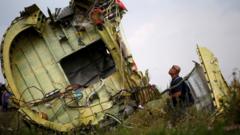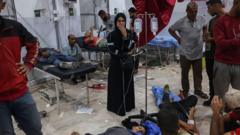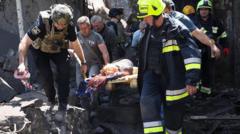In a historic ruling, the International Civil Aviation Organization has concluded that Russia is responsible for the downing of Malaysia Airlines flight MH17 in 2014, impacting families worldwide while reaffirming the need for accountability in international law.
Russia Held Accountable for MH17 Tragedy, UN Agency Declares

Russia Held Accountable for MH17 Tragedy, UN Agency Declares
UN's ICAO states Russia violated international law in MH17 air disaster.
In a significant development for international aviation law, the United Nations' International Civil Aviation Organization (ICAO) has officially stated that Russia bears responsibility for the tragic downing of Malaysia Airlines flight MH17 over eastern Ukraine on July 17, 2014. The aircraft was en route from Amsterdam to Kuala Lumpur when it was struck by a missile, leading to the loss of all 298 passengers and crew members onboard.
The ruling, delivered by the ICAO Council, highlights that the Russian Federation had not fulfilled its international obligations, particularly the directive to avoid using weapons targeting civil aviation. This decision mirrors ongoing disputes surrounding the conflict in eastern Ukraine, which saw a peak in violence at that time due to clashes between pro-Russian factions and Ukrainian government forces.
Most of the victims, including 196 Dutch nationals, were alarmingly from the Netherlands. Other passengers represented various nationalities, including Australians, British, Belgian, and Malaysian citizens. In light of this ruling, the Australian and Dutch governments, who together presented the case to ICAO in 2022, expressed their satisfaction and called for Russia to acknowledge its culpability. Australian Foreign Minister Penny Wong urged Russia to take responsibility for their actions and provide reparations for this devastating event.
Meanwhile, Dutch Foreign Minister Caspar Veldkamp emphasized that the ICAO's decision represents a crucial stride towards seeking justice and accountability for the victims' families. He remarked, "This serves as a clear reminder that no state can act without facing consequences under international law."
Previously, in 2022, a Dutch court attributed the blame to a Russian-controlled group for the incident. This ruling led to implicating and convicting three individuals in absentia, sentencing them to life imprisonment. However, they remain elusive and have not served their sentences, preventing justice from being completely fulfilled.
As the world recalls the MH17 disaster and its tragic implications, the recent ruling raises significant questions about accountability in international conflicts and the role of state actors in safeguarding civilian lives.
The ruling, delivered by the ICAO Council, highlights that the Russian Federation had not fulfilled its international obligations, particularly the directive to avoid using weapons targeting civil aviation. This decision mirrors ongoing disputes surrounding the conflict in eastern Ukraine, which saw a peak in violence at that time due to clashes between pro-Russian factions and Ukrainian government forces.
Most of the victims, including 196 Dutch nationals, were alarmingly from the Netherlands. Other passengers represented various nationalities, including Australians, British, Belgian, and Malaysian citizens. In light of this ruling, the Australian and Dutch governments, who together presented the case to ICAO in 2022, expressed their satisfaction and called for Russia to acknowledge its culpability. Australian Foreign Minister Penny Wong urged Russia to take responsibility for their actions and provide reparations for this devastating event.
Meanwhile, Dutch Foreign Minister Caspar Veldkamp emphasized that the ICAO's decision represents a crucial stride towards seeking justice and accountability for the victims' families. He remarked, "This serves as a clear reminder that no state can act without facing consequences under international law."
Previously, in 2022, a Dutch court attributed the blame to a Russian-controlled group for the incident. This ruling led to implicating and convicting three individuals in absentia, sentencing them to life imprisonment. However, they remain elusive and have not served their sentences, preventing justice from being completely fulfilled.
As the world recalls the MH17 disaster and its tragic implications, the recent ruling raises significant questions about accountability in international conflicts and the role of state actors in safeguarding civilian lives.






















